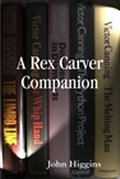
Heinemann
first edition 1967

US first edition
1968

CBC edition
1968

Pan paperback
1969

Pan paperback
1973

Arcturus Crime Classic

Rex Carver Companion
 Heinemann first edition 1967 |
 US first edition 1968 |
 CBC edition 1968 |
 Pan paperback 1969 |
 Pan paperback 1973 |
 Arcturus Crime Classic |
 Rex Carver Companion |
The BookThis is the third of the Rex Carver books, the longest and much the best of the series. As in all four books, the plot involves a hectic travel schedule, in this case to Paris, Italy, Libya, Tunisia and Ibiza. (Canning had previously used the Balearics as the setting for one other novel, The Manasco Road). There is a large cast of characters, few of whom can be trusted. The plot is fairly unexpected and daring, and there is real tension in the dénouement. The secret services, represented by Manston and Sutcliffe, are involved, and there is a frightening sequence when Carver is tortured by Sutcliffe's staff. This foreshadows all the cruelty displayed by "our" side in the Birdcage books that Canning wrote in the 1970s. Hilda Wilkins, Carver's unglamorous but hugely resourceful secretary, is involved as a serious participant rather than as a background commentator, as is her fiancé now called Olaf. The plot mechanism by which she and Carver escape from the villains in the final scene had been used by Canning before in a short story called "A Case of Dollars", published in 1958. Interestingly the plot partly anticipated real life. The demand made by the Soviet agents in this book is for the exchange of their own (fictional) celebrity hostage plus Gerald Brooke, a British teacher held in Russia after being arrested for handing out leaflets, against the handing over by the British government of Henry Houghton, William Vassall, Frank Bossard, and Helen and Peter Kroger, all real-life spies associated with Gordon Lonsdale. Two years after The Python Project appeared, the Krogers were exchanged for Gerald Brooke. (Lonsdale himself had already been exchanged for Greville Wynne.) |
|
|
|
This book was written at a desk in front of a wide window from which I had a glorious view of Ashdown Forest in Sussex. When I began writing in the spring, the house martins which had just returned were busy refurbishing their nests above the window. The view and the activities of the birds should have been distracting. The moment would come, I thought, when I should have to reverse the desk and turn my back on them in order to keep working. Some books come easily, most come hard, so hard sometimes that you feel like chucking the manuscript through the window and going fishing. I did do a little fishing, but on the whole, happily, The Python Project gave me no trouble. Once I had set Rex Carver off on the third of his adventures there was no stopping. I was sitting in Sussex, but each working day I was far away with Carver in Paris, Florence, Rome and North Africa. Spring moved through summer to autumn, and the end of the book. I looked out of the window, trees and bracken had turned to their autumn colouring and the house martins were marshalling their young for flight. I was back in Sussex, journey over, and they were on the point of take-off for North Africa, free as the air, along the route taken by Rex Carver—no passports, no visas, no scraping along on a £50 travel allowance. Well, a book is a bird—just open its wings and you are away, clear of regulations and permits, heading for foreign parts, adventures, thrills and excitement. And that's what I hope you get from The Python Project—and if you don’t, just write and tell me why, and I’ll try to do better next time. |
The £50 travel allowance for British tourists going overseas was introduced by Harold Wilson's government in an attempt to avoid devaluing the pound, and persisted until 1970. No doubt Canning himself could spend more than £50 a year on overseas travel, since he could claim that his trips were research and a business expense rather than tourism.